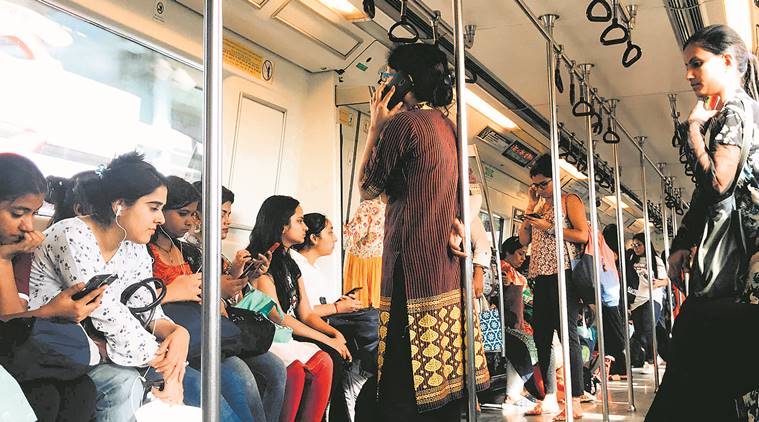
Implementing the separate token policy for women beneficiaries of the Delhi Metro fare waiver scheme will cost at least Rs 90 crore, while launching special smart cards will need at least Rs 126 crore to execute, cost estimates made by the Delhi Metro have revealed. The Metro has further said that both schemes come with a “high risk of misuse”.
Under the special smart card “stopgap” scheme drafted by the DMRC — which, as per its estimates, will take six months to implement — a newly designed smart card will be “linked” to the credentials of an individual and will come pre-loaded with money. This scheme will not require any change in the AFC (Automatic Fare Collection) system, the Metro has stated.
“The beneficiary uses it as a normal card. Whenever the amount is exhausted, automatic top-up facility shall be available to the beneficiary. The initial top-up and subsequent top-ups shall be done from a special account of the Delhi government. Work of identifying the beneficiaries, their registration and initial top-up can be done by a third party for GNCTD,” says the proposed scheme, which has been submitted to the Delhi government.

The capital cost of implementing the scheme and annual running cost have been pegged at Rs 49.89 crore and Rs 77.64 crore. However, the Metro also warned that the scheme comes with risk of misuse by non-beneficiaries as the existing system is not equipped to differentiate between different classes of commuters.
The special token scheme has an estimated implementation cost of Rs 13.79 crore and annual running cost of Rs 77.64 crore. The government is inclined to implement this scheme, which will need eight months to be set up, as announced by Chief Minister Arvind Kejriwal on June 12.
Metro has observed that implementing this scheme will need reversing its policy and having large scale manual vending of tokens. “The scheme depends on manual checks (and) has very high risk of misuse by individuals as well as misuse in organised manner…,” it adds.
DMRC has also sought details on how the Delhi government will pay the subsidy amount of Rs 1,566 crore to it on a sustainable basis. “DMRC, therefore, will have serious financial risk in case this payment is stopped fully or partially at a future date. This is particularly very critical for survival of DMRC, as it has an obligation to pay back huge debt, approx 32,000 crore… This is also critical in view of continuous pressure on DMRC to keep the fare low while input cost, electricity charges, manpower cost and maintenance cost is increasing day by day. Therefore, before implementing the scheme, DMRC will like a firm and reliable arrangement of regular cash flow,” the proposal states.
Kejriwal Wednesday had assured DMRC that payment to it will not be stopped.